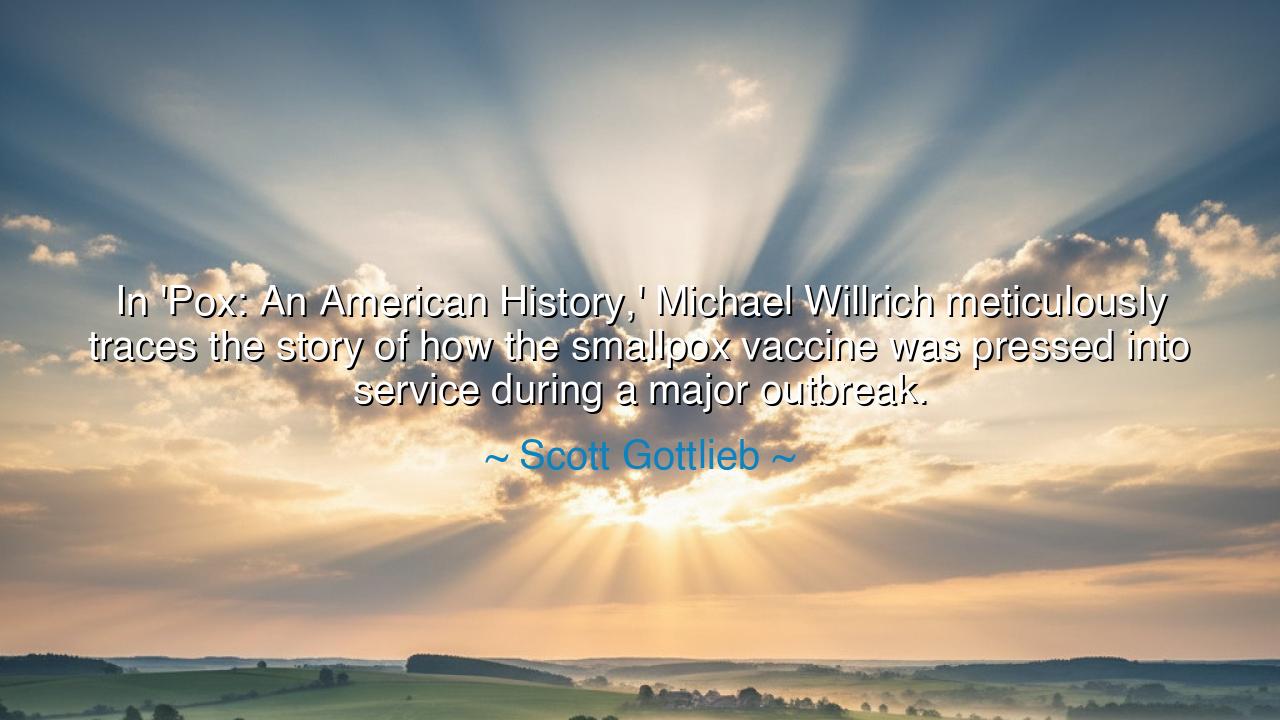
In 'Pox: An American History,' Michael Willrich meticulously
In 'Pox: An American History,' Michael Willrich meticulously traces the story of how the smallpox vaccine was pressed into service during a major outbreak.






“In ‘Pox: An American History,’ Michael Willrich meticulously traces the story of how the smallpox vaccine was pressed into service during a major outbreak,” wrote Scott Gottlieb, invoking not only the chronicles of disease but also the eternal struggle between fear and courage, ignorance and knowledge, chaos and order. This is not merely a tale of medicine—it is a saga of civilization itself. For whenever a plague rises, it tests the heart of humanity. It asks: will we succumb to panic and superstition, or will we, with steady hands and faith in wisdom, forge salvation from despair?
In this quote, Gottlieb calls forth the spirit of an age when science became a weapon of mercy. Michael Willrich’s work stands as a mirror to that tumultuous era—the dawn of the twentieth century—when smallpox, a scourge of ages, stalked the American people once more. Cities burned with fear. Mothers hid their children, some from sickness, others from the needle of salvation. In crowded alleys and wealthy boulevards alike, the specter of infection whispered that no one—not even the powerful—was safe. It was then that the vaccine, born of human genius and sacrifice, was summoned into battle—not gently, but with urgency, discipline, and conviction.
Yet this story, like all that concerns humanity, was not without conflict. The smallpox vaccine became more than a tool of healing—it became a symbol of the struggle between individual freedom and collective responsibility. Some refused it, claiming the right to resist authority; others demanded it, seeing in its promise a chance to save the nation. Thus, the vaccine became not just medicine, but a moral trial. It revealed the truth that every act of public good must wrestle with the private will of the soul, and that every age must decide anew what it means to protect life itself.
From the dust of those battles emerged both suffering and salvation. There were riots in the streets of Cambridge and Milwaukee, where citizens defied compulsory vaccination, believing that liberty meant freedom from any command—even those that saved lives. But as the pox ravaged families and consumed cities, the people learned that liberty without wisdom is but another form of bondage. For true freedom lies not in doing as one pleases, but in doing what preserves the sacred continuity of humankind. The smallpox campaign, pressed into service with imperfect means but noble ends, became a turning point in the moral education of a nation.
And so, Gottlieb’s reflection on Willrich’s book is not merely a commentary on the past—it is a parable for all generations. For disease is not only of the body, but also of the spirit. When ignorance spreads faster than reason, when pride resists truth, when comfort silences conscience, then civilization too becomes ill. The smallpox epidemic of old is reborn in every age that forgets the price of knowledge and the duty of compassion. Each new challenge—be it plague, division, or despair—requires the same eternal courage to act for the good of all.
We see this truth reflected again in our own time, when new pandemics tested the resolve of nations and the wisdom of their leaders. Vaccines were not just medical miracles—they were acts of faith in the human capacity to reason, to care, and to unite. But as before, distrust and selfishness rose like shadows beside the light. History repeats its question: will we cling to fear, or will we remember the lessons written in blood and courage by those who came before us?
Therefore, let this quote serve as both memory and mandate. Let us remember that progress is not born of ease, but of struggle—of minds that choose truth over comfort and hands that work for the good of many rather than the desires of one. Let every healer, every teacher, every citizen recall that the tools of salvation—science, law, and compassion—must be wielded with discipline and humility. For when the next storm comes, it will not be enough to know what is right; we must have the strength to do it.
Thus, from the story of ‘Pox’ and the words of Gottlieb, we learn this enduring truth: knowledge is the torch, courage is the hand, and service is the flame that keeps civilization alive. Let no generation forget to carry that fire forward.






AAdministratorAdministrator
Welcome, honored guests. Please leave a comment, we will respond soon